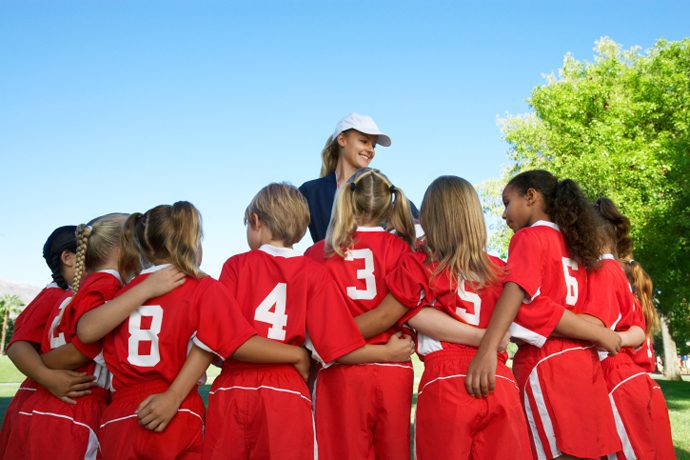 As your child grows older in his youth sports experience, he begins to understand and hopefully accept the grind of athletics: practices, hard work, and self-discipline. In facing these challenges, the onus is on him to dig deep and respond victoriously. But what about the circumstances that your child cannot change? One frustration that your athlete may face–and cannot change–is having a coach that he does not respect. Your child’s hard work is not going to change the coach’s personality and make him worthy of respect. It may be the coach’s style, mannerisms, or knowledge of the game–or lack of it–that frustrates your son or daughter. And often, that affects an athlete’s motivation and may even turn him off to playing sports. My kids have had several coaches over the years that they did not respect. And I don’t mean that they just had personality differences. These coaches earned their lack of respectability by the way they acted, coached, and treated players. Whether it was a coach who was lazy and did very little coaching, a coach who couldn’t even look players in the eyes when he talked to them (a symptom of his inability to connect with the players), or a coach who contradicted everything my child had been taught about the game, we tackled the problem the same in each situation. We stressed respect for the position. We told our kids that they should treat the coach with respect, even when they didn’t respect him as a person. Is that a contradiction? No, I don’t think so. We can treat a person respectfully by listening to him, doing as he instructs, and by not giving a disrespectful attitude. We can agree to disagree agreeably. We can submit to his authority, while still having our own opinions. We encouraged playing for love of the game. My son once played for a coach who he could never seem to please and often came home very discouraged. We told him not play for the coach’s approval, but to play for love of the game, for himself, and, because of his faith, for God. Coaches come and go, so your child should not count on one coach to be his motivation for working hard in his sport. We focused on the team. Your child’s team needs to pull together when they are struggling under a disrespected coach. Not to band against him, but to draw strength and encouragement from each other. No matter what your child thinks of his coach, his team mates need him and they need each other if they are going to work together as a team. Remind your child that he is not playing to make his coach look good, he is playing to make his team look good. Thankfully, when our kids struggled through a season when they didn’t respect the coach, they moved on to another season with a coach they respected and loved, and who helped them become better players. Besides the lessons learned under a disrespected coach, they learned a greater appreciation for the good coaches who crossed their path. Janis B. Meredith has been a sports mom for 20 years, and a coach’s wife for 28, and sees life from both sides of the bench. She writes a popular blog called JBM THINKS.
As your child grows older in his youth sports experience, he begins to understand and hopefully accept the grind of athletics: practices, hard work, and self-discipline. In facing these challenges, the onus is on him to dig deep and respond victoriously. But what about the circumstances that your child cannot change? One frustration that your athlete may face–and cannot change–is having a coach that he does not respect. Your child’s hard work is not going to change the coach’s personality and make him worthy of respect. It may be the coach’s style, mannerisms, or knowledge of the game–or lack of it–that frustrates your son or daughter. And often, that affects an athlete’s motivation and may even turn him off to playing sports. My kids have had several coaches over the years that they did not respect. And I don’t mean that they just had personality differences. These coaches earned their lack of respectability by the way they acted, coached, and treated players. Whether it was a coach who was lazy and did very little coaching, a coach who couldn’t even look players in the eyes when he talked to them (a symptom of his inability to connect with the players), or a coach who contradicted everything my child had been taught about the game, we tackled the problem the same in each situation. We stressed respect for the position. We told our kids that they should treat the coach with respect, even when they didn’t respect him as a person. Is that a contradiction? No, I don’t think so. We can treat a person respectfully by listening to him, doing as he instructs, and by not giving a disrespectful attitude. We can agree to disagree agreeably. We can submit to his authority, while still having our own opinions. We encouraged playing for love of the game. My son once played for a coach who he could never seem to please and often came home very discouraged. We told him not play for the coach’s approval, but to play for love of the game, for himself, and, because of his faith, for God. Coaches come and go, so your child should not count on one coach to be his motivation for working hard in his sport. We focused on the team. Your child’s team needs to pull together when they are struggling under a disrespected coach. Not to band against him, but to draw strength and encouragement from each other. No matter what your child thinks of his coach, his team mates need him and they need each other if they are going to work together as a team. Remind your child that he is not playing to make his coach look good, he is playing to make his team look good. Thankfully, when our kids struggled through a season when they didn’t respect the coach, they moved on to another season with a coach they respected and loved, and who helped them become better players. Besides the lessons learned under a disrespected coach, they learned a greater appreciation for the good coaches who crossed their path. Janis B. Meredith has been a sports mom for 20 years, and a coach’s wife for 28, and sees life from both sides of the bench. She writes a popular blog called JBM THINKS. 
photo credit: gus_estrella via photopin cc
How useful was this post?
Click on a star to rate it!
Average rating 3 / 5. Vote count: 3
No votes so far! Be the first to rate this post.




